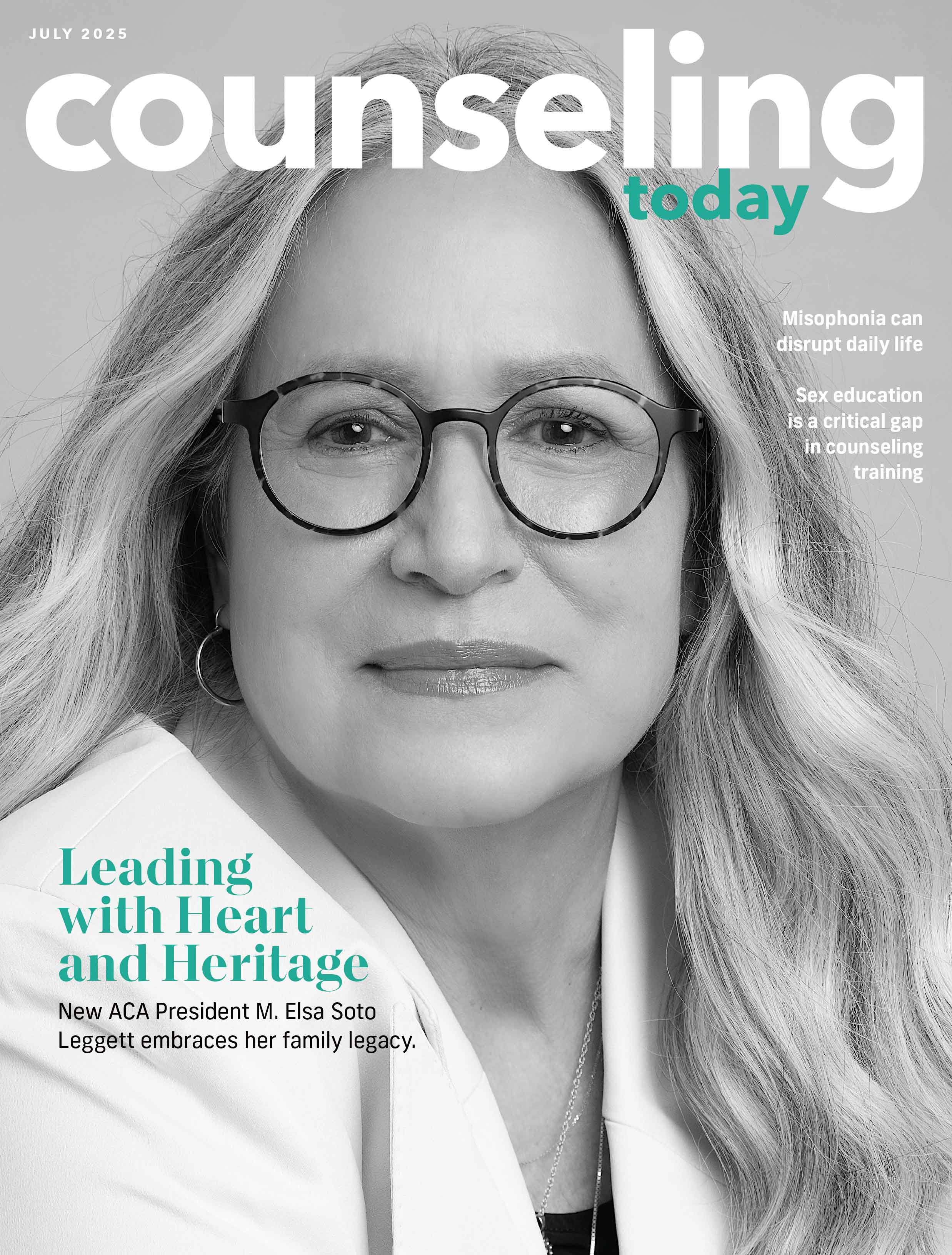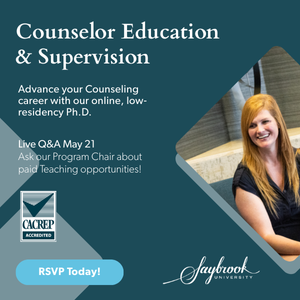Explore Counseling Today Articles
The loss of our ‘humanness’

Recently, I needed to undergo some medical tests in a hospital-based clinic. I arrived a few minutes early and was eventually called inside for my tests, which required four separate parts. Immediately, as I put the swaying, open-backed gown on, I began to feel my humanity slowly slipping away. I now looked like all the other patients in similar attire, and I felt the loss of myself as a human being. I started to feel like an “it” to be worked on. I had felt this way previously for other exams and tests — this was just a “refresher.”
I was prepped, injected and told to wait again; my questions went unanswered. Inside myself, I could feel my anxiety starting to well up and get the best of me. I was finally led to another room and told to lie on a table. The table was cold and uncomfortable and hurt my back, and the feeling of somehow being an “it” to be worked on, not a human being any longer, returned. I was told to raise my arms over my head, and the technician quickly left the room.
The overhanging equipment suddenly whirred noisily and began getting closer and closer to my chest and head, increasing my uneasiness. The machine rotated a bit overhead; I couldn’t see around it at all. I suddenly felt claustrophobic and a bit panicky, and finally called out for the technician after several minutes. He answered from an adjoining room and asked what was wrong.
I said I was feeling a bit anxious, asked what this test was for and asked how long it would last. He answered bluntly, “It’s for the tests you’re having.” He then aimed a fan at my head to help “with people like me,” he stated. I immediately felt demoralized again and was told it would be another five minutes under the whirring machine.
I was finally released from the “jaws” of the overhead machine. As I started to rise, I felt dizzy at first, perhaps because I had my arms stretched over my head for several minutes. I was escorted out of the room and sent back to the waiting room, again, alone with my thoughts. (It’s been my experience that human beings do not like a void of information. We try to obtain it the best way we can, and when that fails, we begin to make assumptions, which are often inaccurate. It’s simply what people do and is part of the human condition — if only the medical profession acknowledged that.)
There sat the others, all waiting for their time under the machine. I didn’t dare tell them not to worry, our eyes never meeting. Internally, I felt scared about what the tests could reveal and what else was in store. The same concern seemed etched on the faces of those in that waiting room. I wondered, “What if someone had just taken the time to explain what was happening to us and what we were about to experience?”
Taking time to connect
As I sat there worrying, waiting for my next exam, I began to wonder, “As counselors, do we take time during the essential beginning session to discuss with our clients what counseling is really all about?” Often, clients don’t know what to expect from counseling. Ours is a relatively new profession, and many clients, for example, did not even have counselors in their schools when they were growing up. Or the counselor role was so diminished, they rarely met them in person. Moreover, many schools did not even employ counselors until recently. Are we selling our clients short by taking it for granted that they simply intuitively know what to expect?
My diagnostic testing felt demeaning. With no sense of control, I felt a bit overwhelmed. In the end, I just wanted it all to be over. So, I sullenly complied with every command, didn’t ask more questions and couldn’t wait to leave. The experience — which was more psychologically than physically painful — left me with a bitter taste in my mouth, and I never wanted to return.
The parallels with counseling jumped out at me. Do our clients feel the same sometimes? Is that why many don’t want to return? For instance, according to Joshua Swift and Roger Greenberg, in a meta-analysis published in 2012 in the Journal of Consulting and Clinical Psychology, 1 in 5 clients end psychotherapy prematurely. As counselors, do we spend the necessary time to understand the culture and concerns of our clients, as well as address their fears?
Those special medical technicians who do take the time to develop a human connection first make all the difference in one’s experience. Can we say the same for ourselves as counselors? As human beings, we all crave human connection; it is the very heart of counseling. For the sake of time, are we rushing through this vital aspect of the process?
How we treat our clients
I am reminded of the many times I got extremely busy as an agency clinician and, later, as a school counselor in my own career. I would see the long line waiting at the door of our school counseling offices or sigh a bit when one of my clients finally disclosed that huge revelation they’ve been holding back the last six sessions, with five minutes left in our meeting. My heart would sink as I realized I couldn’t go over the session time because my next client was waiting. During those times, I remembered that as counselors, we are instructed not to get “too close” to our clients for fear of losing our objectivity.
Although being objective is vital to the counseling relationship and the client’s well-being, does it also mean that we must sacrifice their humanity? Sadly, I have worked with some physicians, nurses and respiratory therapists (one of my former professions) who have become cold, distant and indifferent to their patients. They have absorbed the “lesson” about not getting too close to their patients all too well and have become detached when their patients don’t respond well to their interventions or ultimately die. It allows them to not “feel” and to go on with their “routine” activities as if they were working on “machines.” Their patients know, though, and are left feeling demoralized, defeated and not heard — just like I was during my exams.
The ability to have empathy is the cornerstone of being a counselor and a counselor educator. Without this ability, we are doing our clients and students a disservice and, possibly, irreparable harm. To a degree, the ability to have empathy for the “least deserving” of our clients (e.g., individuals who have committed murder, rape or child abuse) is what sets us apart from those who are not counselors by trade. If we reject our clients for the behaviors they have committed, then we too have lost our sense of humanity for them and will judge them, harshly, just as society has.
As counselors, we never have to condone or agree with a behavior that a client has done, but we do have to see them as a human being, deserving of our care, and believe in their willingness and abilities to want to change. If we also reject these clients for the behaviors they have committed, then we have endorsed their beliefs of self-loathing and pity. We reinforce their negative self-beliefs that they are unable to ever heal and that they are undeserving of comfort, compassion and understanding. Arguably, we doom them to repeat their behaviors by our rejection, disdain and judgment. If we don’t believe in this fundamental aspect of counseling — that all persons can change and deserve our respect — then, sadly, it may be time for us to find a new career.
Finding our own balance
Not getting “too close” to our patients or clients is a self-protection mechanism. It is fundamentally a correct premise, but humanely flawed. Finding a balance between objectivity and empathy is the key. Whether we are treating patients or clients, the same premise applies. It is essential to their well-being and, I posit, to yours as well that you find your balance and always reevaluate and assess it. If you feel yourself becoming resentful toward some of your clients, or feel too rushed with them, or feel that you are becoming too preoccupied with the time spent on them, challenge yourself to be proactive to take the internal steps to work on this.
If the system needs changing, find the courage to be the voice for your clients. If working with clients in a group setting makes more sense, initiate that adjustment. If challenging the status quo requires speaking up, do so for the sake of your clients. Remember the basic tenets of your code of ethics — to always advocate for social justice, equity and cultural competence. If you need more training, obtain it. If you need more supervision, don’t be afraid to ask for it. Not only will you be following the ethical principles of self-care and wellness, but your clients will benefit from your self-investment tenfold.
If any of this resonates with you as a clinician, that is a healthy response. Human beings were not designed to be “garbage bags,” to continually just stuff our feelings until we are about to explode. If we do so outwardly, we are accused of just being too angry and emotional; when the implosion is internal, it can lead to deep and unresolved depression. No one wants to feel like they are not being listened to, are not being heard and are simply “taking up another’s time.”
If you can relate to having felt this way during a medical exam or trip to your doctor, then you can relate to what it may feel like being a client and being afraid no one will understand you. Some clients can get past some rudeness or hurriedness of staff, but they won’t do so with you as their counselor. The adage that a person may not remember everything that you say but will definitely remember how you made them feel is so true.
When we are treated as less than human, we lose our humanity. For those who do it to us, unconsciously or not, they do too. Our treatment of each other becomes rote, mechanical and unattached. The preambles to the ethics codes for both the American Counseling Association and the American School Counseling Association share the principles of autonomy, beneficence and nonmaleficence; these are essential tenets to practice our counseling craft and to live by. A basic premise of counseling is to form a therapeutic relationship of trust. It is incumbent upon all of us as counselors and human beings to always remember to do just that.
Best wishes to each of you.
Suzanne A. Whitehead is an associate professor and the program coordinator of the counselor education program at California State University, Stanislaus. She is a licensed mental health counselor, a retired school counselor and a licensed addiction counselor. Contact her at swhitehead1@csustan.edu.
The views expressed in Counseling Today are those of the authors and contributors and may not reflect the official policies or positions of the editors or the American Counseling Association.
- Ethics, Legal, Healthcare Regulation & Compliance
- Professional Counseling
Search CT Articles
Filter CT Articles
Current Issue
Sign Up for Updates
Keep up to date on the latest in counseling practice. Sign up to receive email updates from Counseling Today.



